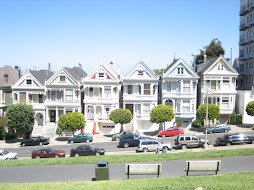In an interesting combination of several issues, the Department of Homeland Security has announced that it received the necessary environmental waivers to push through its plans to finish the 670-mile border fence. It involved Congressional approval of a package of more than 30 waivers.
Possible environmental concerns regarding the fence include obstruction of migratory paths of creatures ranging from butterflies to a type of wildcat called an ocelot. The waivers involve around 10 miles of construction in the Otay Mountain region, east of San Diego.
Link: http://www.latimes.com/news/science/environment/la-na-fence2apr02,1,6428571.story
Wednesday, April 2, 2008
L.A. Clinic Offers Care for Mayas/Karla Saia
Due in large part to tenacious outreach efforts, Los Angeles’ Clinica Romero is serving a growing Maya immigrant population, a group which has traditionally been relatively alienated from Western and institutionalized health care.
For the last eight years Idalia Xuncax, herself a Maya, has grown the clinic’s Maya clientele from a handful to approximately 700, and in doing so has brought preventive and routine care to a group leery of doctors. Further, she has learned to manage care for these immigrants – generally from Guatemala – in terms of other cultural and historical healing practices the community employs.
The clinic is receives funding from private donors, County, State and Federal Funds. As a result of the work by Ms. Xuncax and her colleagues, the Federal Government has agreed to fund the clinic’s healthcare research into Mayas in Los Angeles.
Link: http://www.latimes.com/news/local/la-me-mayan2apr02,1,7177882.story
For the last eight years Idalia Xuncax, herself a Maya, has grown the clinic’s Maya clientele from a handful to approximately 700, and in doing so has brought preventive and routine care to a group leery of doctors. Further, she has learned to manage care for these immigrants – generally from Guatemala – in terms of other cultural and historical healing practices the community employs.
The clinic is receives funding from private donors, County, State and Federal Funds. As a result of the work by Ms. Xuncax and her colleagues, the Federal Government has agreed to fund the clinic’s healthcare research into Mayas in Los Angeles.
Link: http://www.latimes.com/news/local/la-me-mayan2apr02,1,7177882.story
Tuesday, April 1, 2008
Proposed Gas Tax May Drive Prices Higher/ Claudia Paredes
AB2558 is a piece of legislation that is being introduced by Assemblyman Mike Feuer and supported by the Los Angeles County Metropolitan Transportation Authority that would effect drivers in Lost Angeles County. Motorists would pay a fee of up to 3% of the price of gas (which translates into an extra 9 cents per gallon) or an additional fee of $90 on their vehicle registrtation that would all go towards fighting global warming. This registration fee would be higher for cars, trucks and SUVS in the hopes to discourage drivers from using these vehicles. The funding gained from this fee would be used for improvements to mass transit and programs aimed to relieve traffic congestion.
Opponents of this bill say that this is exploiting public sympathies to increase funding for a public transportation programs that already exist. They also point to the fact that gas is already taxed enough.
With the current budget deficit, funding for transportation and other local concerns must look towards new sources. Though the decision to put this bill on the ballot remains in the air, environmentalists argue that it is a local action to the problem of climate change that the federal government is not adequately responding to.
Link: http://www.latimes.com/news/local/la-me-taxes1apr01,1,7566510.story
Opponents of this bill say that this is exploiting public sympathies to increase funding for a public transportation programs that already exist. They also point to the fact that gas is already taxed enough.
With the current budget deficit, funding for transportation and other local concerns must look towards new sources. Though the decision to put this bill on the ballot remains in the air, environmentalists argue that it is a local action to the problem of climate change that the federal government is not adequately responding to.
Link: http://www.latimes.com/news/local/la-me-taxes1apr01,1,7566510.story
Subscribe to:
Comments (Atom)
